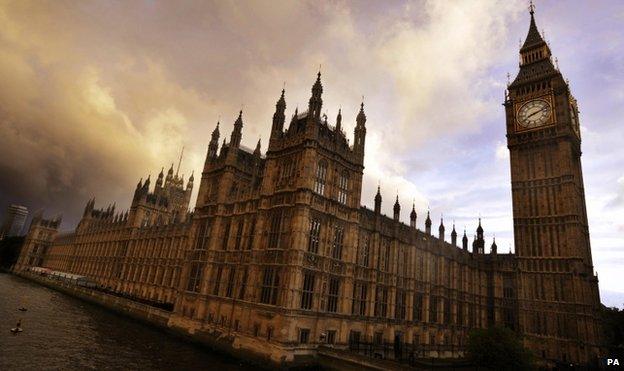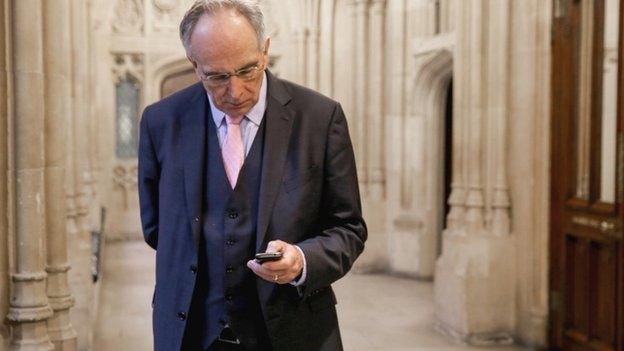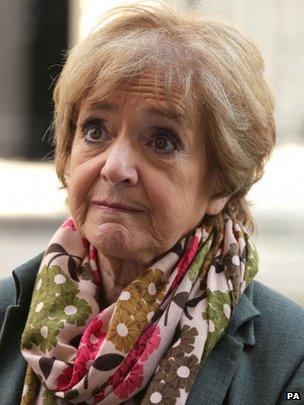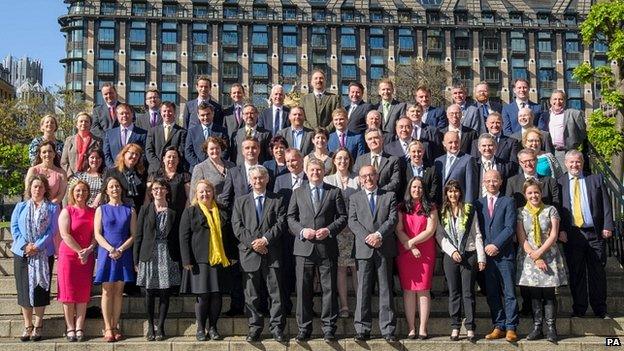What will the new Parliament look like?
- Published

It will seem very strange.
David Cameron will deliver a Queen's Speech. Harriet Harman, as acting Leader of the Labour Party, will respond for the opposition. In due course the leader of the third party will rise - not a Lib Dem, but the SNP's Angus Robertson.
It will be a sight as jarring as the appearance of Lib Dems on the government front bench in 2010. And somewhere in a corner, pushed out of their previous front-bench perch, the remaining Liberal Democrats will gather.
Eventually, some way into the debate, one of their number will be called to speak. And so the new shape of the new Commons will be made manifest.
What will this new Parliament be like? For Commons-watchers, the basic question for the next few months is whether, with an outright majority government now in office, the House will default back to its factory settings, and abandon the habit of backbench power and rebellion that shaped the previous five years.
Rebellions?
We saw backbench MPs amending bills and passing resolutions in the teeth of government opposition, often with profound consequences. Remember the Syria vote? Or the huge Tory rebellion which forced David Cameron into backing an EU membership referendum?
The government majority is small but for it to be overturned there has to be a cause which unites all the other parties, and a band of Tory rebels.
And it is quite hard to imagine an issue on which, say, 10 Tories would peel off, which could also attract not just Labour and SNP votes but also those of every other opposition MP, from Caroline Lucas to Nigel Dodds.
Not Europe, not the Human Rights Act, not HS2, not Heathrow expansion, not benefit cuts (although that might come closer than some of the others) not devolution.

Will Peter Bone hold the balance of power?
A perfect storm of dissent, disillusionment and revenge would be required to get such a diverse band into the same lobby on the same issue, to defeat the government.
On election night I tweeted that the balance of power in the Commons was now held by Peter Bone, the generalissimo of the Euro-rebels. Maybe. But only when that perfect storm hits.
On these numbers the government can expect to be able to divide and rule the opposition almost all the time, and the main threat of defeat lies in unexpected ambush, rather than a gradual massing of the opposition clans.
Backbenchers, though, will remain a handful. The 2010 Commons was the most rebellious in modern history, and often seemed beyond the control of traditional whipping. The new Government Chief Whip, Mark Harper, is regarded by Labour observers as an "inspired" appointment.
He cut his teeth selling Nick Clegg's constitutional agenda to his Conservative colleagues, which required a certain mastery over the art of the hard sell. Labour sources still speak with awe about his unyielding approach to negotiations with their heavyweight, Lord Falconer, on the Parliamentary Voting and Constituencies Bill in the early coalition years, which produced some of the nastiest meetings many had ever experienced (quite an accolade).
'Visible' danger
One obvious challenge will be a well-organised and tactically smart band of Eurosceptics, who will be a force to be placated, throughout this Parliament.
At the moment they are happy in the expectation that an In/Out referendum will be delivered in the coming years, although they have a shopping list of demands around the conduct of the referendum.

Will there be a challenge to Margaret Hodge?
But the biggest long-term challenge may well come if the prime minister recommends a vote to stay in, on the basis of concessions and changes to Britain's membership terms which they see as cosmetic.
This is clearly a danger but it's visible on the horizon now, which means it should be manageable. Defence spending looks like another danger area but, again, one that is visible and manageable.
Mr Harper and his team might try to avoid heavy-handed House of Cards-style intimidation in favour of more persuasion and, crucially, accommodation of backbenchers' concerns. And if those fail, there's always one other tool available. Always remember that the old-fashioned job title for the Chief Whip is "Patronage Secretary."
Behind the scenes, expect a frenzy of electioneering. The candidates for the Labour leadership will treat every question time as an audition… and watch out for professional fouls from opponents in front of them, and behind.
Elsewhere there will be plenty of candidates for select committee chairs strutting their stuff. Exactly who runs for what will depend on the carve-up of committees agreed between the parties.
But two chairs, of the Public Accounts Committee (PAC) and the Backbench Business Committee (BBCOM), are always held by opposition MPs.
Both are plum jobs and Margaret Hodge made herself a national figure from the chair of the PAC, with a blistering campaign against tax evasion and some striking public dressings-down of multinational companies and quangocrats. She may face a challenge, both because the job is such an attractive one and because some critics feel she's over-reached in her use of the committee as a bully pulpit (pun intended).
The chair of BBCOM will be open, because the (non) incumbent, Natascha Engel, is not re-standing. And it will be interesting to see if her successor will be faced with an attempt to clip the committee's wings, perhaps by removing its right to table voteable motions.

With a 56-strong contingent of MPs, the SNP will get greater committee representation
Elsewhere, due to an assortment of defeats, promotions and retirements, the chairs of the Foreign Affairs, Justice, Defence, International Development, Energy, Environmental Audit, Environment Food and Rural Affairs, Culture and Scottish Affairs committees are open. And the reality is that all the committees are potentially up for grabs, if challengers to incumbent chairs emerge, or if the incumbent is effectively removed by a change in the party to which that particular chair is allocated.
One obvious change will be the Scottish Affairs Committee, where the chair must surely go to an SNP MP. They may take a mordent pleasure in installing Dr Eilidh Whiteford - who, as a member of the previous committee, was at the centre of a memorable and nasty spat with the previous chair, Labour's Ian Davidson.
And, given their domination of Scotland, they may well demand a majority of the seats on that committee. The SNP would probably be entitled to one other committee as well - I wonder if they'd fancy energy?
In the last parliament, a pattern developed in which Labour MPs voted for the most independent-minded (or, to take another view, awkward) Tory into office, thus helping the likes of Rory Stewart, Sarah Woolaston and Andrew Tyrie to preside over important committees.
It seems likely there will be a bit of mischief and some cross-party dealing involved in the next set of committee elections, and that could put some pretty interesting people in some pretty interesting places.
A really sharp chair can transform a sleepy backwater committee into a must-watch headline generator. Home Affairs and the Treasury are always important committees, but with Lord Chancellor Gove tasked with bringing in a new British Bill of Rights, Justice may become pretty hot, too.
So the elections for these chairs, and their members, will matter a lot.